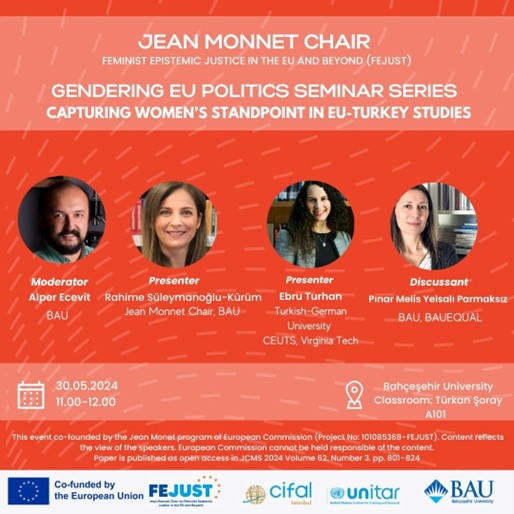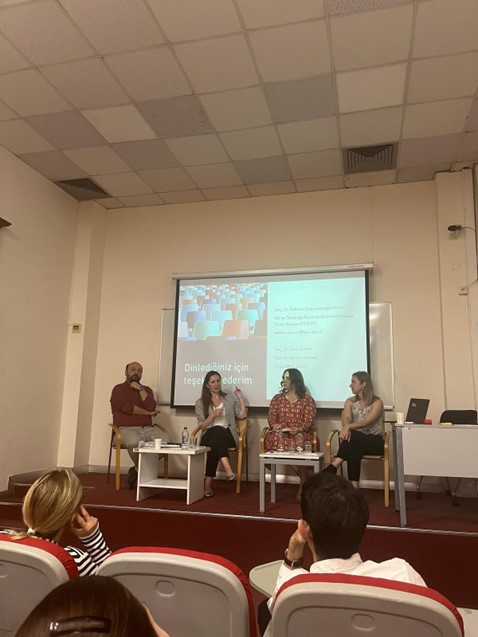Title: Capturing Women’s Standpoint in EU-Turkey Studies
Date: 30 May 2024
Speakers: Ebru Turhan and Rahime Süleymanoğlu-Kürüm
Moderator: Alper Ecevit, Bahçeşehir University
Discussant: Pınar Melis Yelsalı Parmaksız, Bahçeşehir University

The eighth seminar in the Gendering EU Politics series, titled “Capturing Women’s Standpoint in EU-Turkey Studies,” featured an engaging discussion led by Assoc Prof Ebru Turhan and Assoc Prof Rahime Süleymanoğlu-Kürüm. The speakers presented insights from their co-authored paper, which was published as an open-access article in the prestigious Journal of Common Market Studies. The paper delves into the gendered dynamics of EU-Turkey relations, critically examining how women’s standpoints have been included, excluded, or misrepresented in these studies. By bridging feminist standpoint theory and EU studies, the authors offered a fresh perspective on the integration of gender-sensitive approaches in analyzing EU-Turkey relations.
About the Speakers:
Ebru Turhan works as Associate Professor of European Studies at the Department of Political Science and International Relations, Turkish-German University (TDU), Istanbul. She also serves as a senior research fellow at the Institute for European Politics (IEP) in Berlin and at the Center for Turkey and European Union Studies (CETEUS) of the University of Cologne. Turhan functioned as the academic coordinator of the Jean Monnet Module ‘INSITER-Inside the Turkey-EU Relations’, co-financed by the European Commission. Before joining the Turkish-German University in September 2015, she was a Mercator-IPC fellow and post-doctoral researcher at the Istanbul Policy Center (IPC) of the Sabancı University and a senior analyst at the Berlin representation of the Turkish Industry and Business Association (TÜSİAD). Turhan holds an MA in Contemporary European Studies (with distinction) from the University of Bath, UK and a PhD in Political Science (summa cum laude) from the University of Cologne, Germany. Her current research interests include EU-Turkey relations, external differentiation, German-Turkish relations, degendering and decolonizing knowledge, and research synthesis techniques. She is the recipient of the 2020 Teaching Excellence Award of the VIADUCT Jean Monnet Network and the co-editor of the recently published open access edited volume EU-Turkey Relations: Theories, Institutions, and Policies (Palgrave Macmillan, 2021, https://link.springer.com/book/10.1007/978-3-030-70890-0).
Rahime Süleymanoğlu-Kürüm is an Associate Professor at the Department of Political Science and International Relations at Bahçeşehir University and Jean Monnet Chair of Feminist Epistemic Justice Beyond the European Union (FEJUST). She completed her undergraduate degree in International Relations at Eastern Mediterranean University in 2005, and her Master’s degree in International Law at the University of Nottingham in 2006. Dr. Süleymanoğlu-Kürüm also received her PhD in Politics and International Relations from the University of Nottingham in 2012. Currently, she is an external research fellow of the Nottingham Interdisciplinary Centre for Economic and Political Research (NICEP). Dr. Süleymanoğlu-Kürüm conducts research in the fields of Europeanization, European Union and gender equality policies, gender in diplomacy, and elite sociology in bureaucracy. She is the author of the book ‘Conditionality, the EU and Turkey’, published by Routledge in 2019, and the editor of ‘Feminist Framing of Europeanisation’ published by Palgrave Macmillan in 2021. Her articles have been published in high-impact journals such as Geopolitics, Political Studies Review, Third World Quarterly, and the Journal of Common Market Studies.
Dr. Turhan and Dr. Süleymanoğlu-Kürüm highlighted key case studies and empirical findings to emphasize the importance of incorporating women’s experiences and perspectives into the broader narrative of EU-Turkey studies. Their presentation stimulated a rich dialogue on the intersection of gender, politics, and diplomacy, providing thought-provoking critiques of the traditional androcentric approaches that dominate the field.
The seminar was moderated by Alper Ecevit, who ensured the discussion remained dynamic and accessible to a diverse audience. Pınar Melis Yelsalı Parmaksız, as the discussant, contributed valuable insights, raising questions about methodological frameworks and the implications of the authors' findings for future research in the field.

The seminar attracted 20 participants, including undergraduate and postgraduate students, academics, and professionals from a range of disciplines. Participants engaged actively in the Q&A session, exploring themes such as the role of feminist epistemologies in reshaping EU studies and the challenges of mainstreaming gender in EU-Turkey relations.
For those interested in exploring the paper discussed, it is available as open access in the Journal of Common Market Studies.
This seminar underscored the importance of bringing feminist perspectives to the forefront of EU studies and inspired participants to think critically about the integration of gender into analyses of international relations and policy-making.